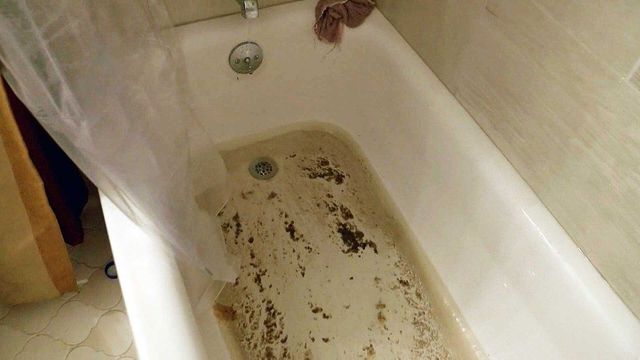Uncovering Why Sewage Comes Up Through the Bathtub
Uncovering Why Sewage Comes Up Through the Bathtub
Blog Article
In this article in the next paragraphs you might get a good deal of sensible points about Why sewage is coming up through your bathtub.

Sewage back-up in the bathtub can be a traumatic and unsanitary trouble for any kind of property owner. Not only is it bothersome, yet it additionally positions significant health threats and suggests underlying problems with the plumbing system. Understanding why sewage is showing up with the bath tub is important for taking proper activity to address the trouble effectively.
Intro to the Concern
Understanding the Problem
When sewer draws back up into the bathtub, it's a clear indication of a trouble with the drainage system. The wastewater that needs to be flowing far from your home is instead finding its back into your space, which can result in significant damages and health hazards.
Potential Reasons
Several factors can add to sewage backup in the bathtub. From blockages in the drain line to issues with the plumbing framework, determining the root cause is vital for finding a solution.
Typical Factors for Sewage Back-up
Obstructions in the Sewer Line
One of the most common sources of sewer backup is a blockage in the drain line. This can occur because of the buildup of debris, grease, or foreign things in the pipes, stopping appropriate flow and creating sewer to back up right into your tub.
Tree Origin Breach
Tree roots looking for moisture and nutrients can penetrate sewer lines with small splits or joints. Over time, these roots can grow and broaden, triggering considerable damages to the pipelines and leading to sewer back-up issues.
Aging Facilities
Older homes may have obsoleted plumbing systems that are much more vulnerable to corrosion, cracks, and damage. As pipelines age, they come to be extra prone to leakages and blockages, enhancing the possibility of sewage backup incidents.
Heavy Rainfall or Flooding
During durations of heavy rainfall or flooding, the sewer system may end up being overloaded with excess water, triggering back-ups and overflows. This can lead to sewer backing up right into tubs and various other components inside the home.
Health And Wellness Risks Connected With Sewage Back-up
Contamination of Water Supply
Sewage back-up can contaminate the water supply in your house, presenting a significant wellness risk to you and your family. Direct exposure to infected water can bring about intestinal issues, skin infections, and various other health problems.
Spread of Disease
Sewage consists of unsafe germs, infections, and bloodsuckers that can trigger a range of illness, including hepatitis, cholera, and gastroenteritis. Coming into contact with sewage or polluted surfaces puts you in danger of infection.
Mold Growth
Wetness from sewer back-up can produce ideal problems for mold growth in your home. Mold and mildew spores can worsen breathing issues and create allergic reactions in delicate individuals, making punctual clean-up vital.
Signs of Sewage Backup
Foul Odors
Unpleasant smells emanating from drains or fixtures, especially in the restroom, might show sewer backup concerns. These odors are often strong and relentless, indicating a trouble that needs immediate interest.
Slow Draining Fixtures
Tubs, sinks, and bathrooms that drain pipes slowly or otherwise in all could be experiencing sewage backup. If numerous fixtures are affected all at once, it's likely that the concern originates from a typical point, such as the major drain line.
Gurgling Noises
Weird gurgling or bubbling sounds coming from drains when water is running elsewhere in your home are a measure of air caught in the plumbing system. This air buildup can result from sewage backup and should be examined immediately.
Immediate Actions to Take
Turning Off Water Supply
In the event of sewage back-up, it's necessary to switch off the water system to avoid additional contamination and damages. Locate the primary water shutoff valve in your house and shut it off till the concern can be fixed.
Calling a Professional Plumber
Handling sewage backup is not a do it yourself task. Contact a qualified plumber with experience in handling sewage-related problems to evaluate the situation and execute required repair work or cleanups.
Avoiding Contact with Polluted Water
Up until the sewer back-up is resolved, prevent contact with polluted water to avoid the spread of germs and pathogens. Put on safety gear if you should be in the affected area and clean your hands extensively afterward.
Safety nets
Regular Upkeep of Sewage System Lines
Arrange routine evaluations and maintenance of your drain lines to identify and resolve possible concerns before they intensify into major troubles. This can consist of cleaning out particles, checking for tree root breach, and repairing any kind of broken pipes.
Mounting Backwater Shutoffs
Take into consideration mounting backwater valves in your plumbing system to prevent sewage from receding right into your home throughout periods of heavy rainfall or flooding. These shutoffs instantly close when water starts backing up, securing your building from contamination.
Appropriate Disposal of Family Waste
Prevent flushing anything other than toilet tissue and human waste down the commode to prevent blockages and blockages in the sewer line. Dispose of grease, oil, and other household chemicals correctly to reduce the danger of plumbing issues.
Tidying up After Sewage Back-up
Sanitation Procedures
Completely sanitize and sanitize affected areas after sewage backup to remove hazardous germs and prevent mold and mildew development. Use appropriate cleansing items and protective gear to make certain secure and effective clean-up.
Remediation of Influenced Areas
Fix any damages to floor covering, walls, or components brought on by sewer back-up. Depending on the extent of the damages, you may require to replace carpets, drywall, or various other products to recover your home to its pre-loss problem.
Why is There Sewage Coming Up Through the Bathtub
Sewage in your bathtub is a major problem that can make you want to abandon the bathroom for good. You don’t have to. However, it is important to identify the source of the issue and take the necessary steps to resolve it in order to avoid any health risks and property damage. In this article, we will discuss what could be causing sewage to back up through your bathtub so you can take action quickly and effectively.
The Main Reason For Sewage Backup in The Bathtub
All the sinks and toilets in your home connect to different pipes that lead to the main sewer line. The sewer line then connects to the municipal sewer system. This connection works seamlessly on a daily basis, but there can sometimes be a problem with the main sewer line.
The most common cause of sewage backup is a clogged or blocked main sewer line. The main sewer line can be clogged due to the accumulation of debris, tree roots or grease buildup, or other materials. Another possible cause is a collapsed pipe. When this happens, your toilets and sinks won’t be able to drain properly. This is when sewage starts backing up through the bathtub. If the problem has been occurring for some time now, it might be time to consult with a plumber as there may be more severe damage that needs fixing.
How Can You Tell if it’s Coming From Your Sewer Line?
If you’re experiencing a sewage backup in your bathtub, then you can use a few simple methods to determine if it is coming from the main sewer line. First, try to unclog the tub drain with a plunger or an auger and see if that helps. If not, then inspect all of the drains in your house and check if there is any blockage in them. If some of the other drains are not working fine, then it’s likely the problem is with your main sewer line.
Common Signs of a Clogged Main Sewer Line
If you suspect that your main sewer line is blocked, then there are a few common signs to look out for. Frequent clogs in your home are a sure sign of a clogged sewer line. You can also check for slow drainage from all the plumbing fixtures.
Slow Drains
If you notice that it takes longer for your sinks and toilets to drain, then this could be a sign of a clogged main sewer line.
Frequent Clogs
Another common sign is that your drains or toilets become clogged almost all of the time. If this happens, then it could be a sign that the main sewer line is blocked.
Water Backup
Do you notice water or sewage coming back up from any of the drains in your home? If your answer is yes, you may have a clogged main sewer line.
Sinkholes
If you’ve noticed sinkholes in your yard or overflowing sewage from the ground, you may be facing a blocked sewer line issue.
Your Shower or Sink Makes Gurgling Noises
Have you noticed gurgling noises coming from your sink or shower lately? These are typically signs of a blocked sewer line and should be checked out immediately.
How to Prevent a Main Sewer Line Clog
Once you’ve identified that your main sewer line is clogged, it’s important to take steps to prevent it from happening again. The best way to do this is to avoid putting any solid material that can clog the drain, such as grease and other debris. You should also be mindful of what you flush down your toilet. In addition, you should schedule regular maintenance for your main sewer line. This will help keep it clear and free from clogs or backups.
What Should You do if You Notice Sewage Backing up Through The Bathtub?
If you’ve noticed sewage backing up through the bathtub, then it is important to call a professional plumber immediately. A plumber can inspect the situation and determine what the cause is, such as a blocked main sewer line. They will also be able to advise you on how best to fix the issue. In some cases, a simple drain cleaning may be all that is needed.
However, if the blockage is severe, then your plumber may need to use more advanced methods to clear the blockage.
No matter what, it is important to always call a professional plumber if you experience any kind of sewage backup. They will be able to assess the situation and provide you with a solution that is best for your home.
https://baylorinc.com/blog/why-is-there-sewage-coming-up-through-the-bathtub/

Hopefully you enjoyed reading our section about What To Do If Sewage Starts Backing Up Into the Shower. Thanks for taking a few minutes to read through our article. Please take the time to promote this article if you appreciated it. Thank you for being here. Come back soon.
Explore
Report this page